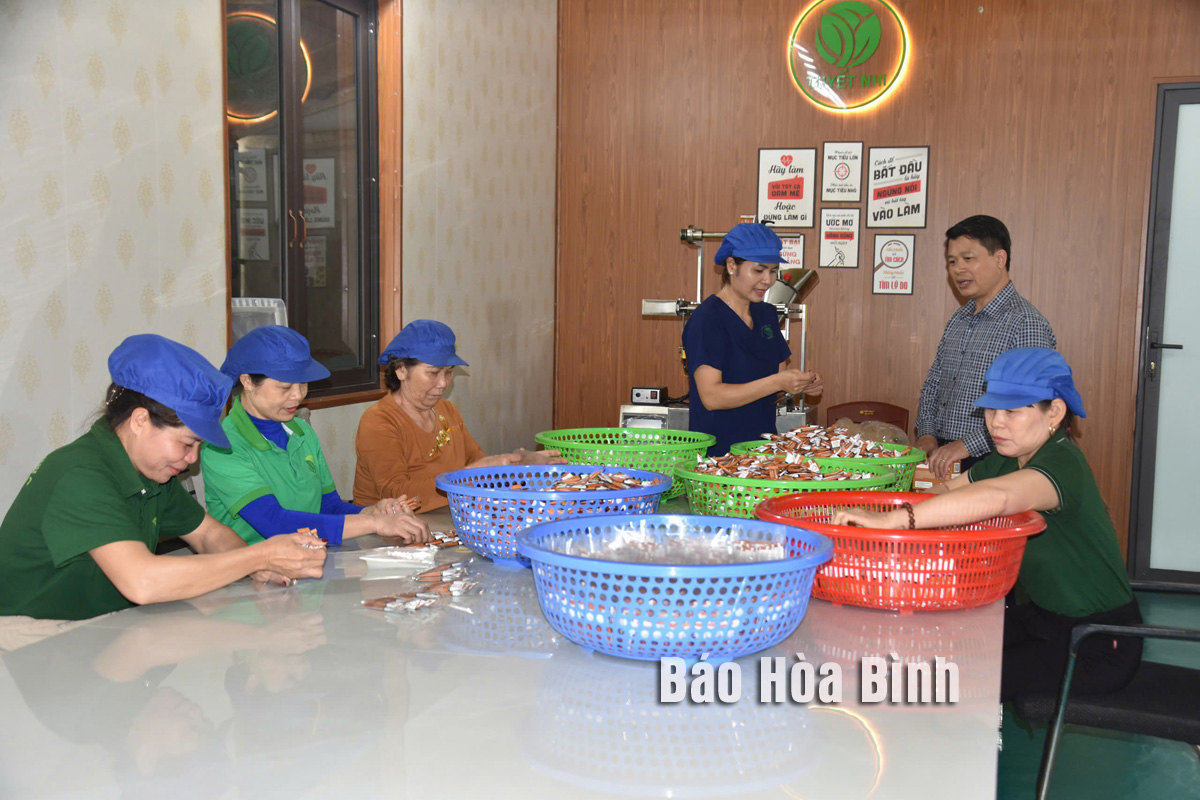
Nguyen Anh Tuyet, hailing from a family steeped in the ancient art of herbal medicine, is transforming local medicinal herbs into high-value concentrated extracts, elevating their worth and healing potential.
The Tuyet Nhi cooperative’s herbal processing workshop in Cao Duong commune,
Luong Son district offers jobs to local workers, with a stable income ranging
from 5-6 million VND per month.
Tuyet's journey began with a deep-rooted passion
for preserving her family's herbal legacy while addressing the challenges faced
by local farmers. As the cultivation of medicinal plants like ca gai leo
(Solanum procumbens) and xa den (Celastrus hindsii) flourished, farmers
grappled with unstable markets and price manipulation by traders. Tuyet saw an
opportunity to stabilise the market and ensure fair prices for these precious
herbs.
In 2017, Tuyet registered her business,
committing to purchase xa den leaves at stable prices. However, she soon
encountered a significant hurdle: the dried xa den leaves were susceptible to
mold due to humidity, compromising their quality and usability. Undeterred, she
invested in technology to process these herbs into concentrated extracts,
preserving their potency and extending their shelf life.
After years of experimentation and perseverance,
Tuyet perfected the production process in 2020, creating a high-quality,
concentrated herbal extract with a distinct aroma and ease of use.
As customers recognised the convenience and
effectiveness of her products, Tuyet, along with six partners, established the
Tuyet Nhi cooperative in 2021, investing in a production facility with advanced
machinery and standardised operations under the HACCP quality management system
The cooperative’s herbal extracts gained
widespread trust for their ease of use and longer shelf life compared to raw
herbs, ensuring patients could access medicinal benefits without concerns about
spoilage.
Today, Tuyet has introduced 10 liquid and
powdered extracts to the market, most of which are produced on demand for
distribution companies. The ca gai leo and xa den extracts have been certified
as 4-star OCOP (One Commune One Product), with more certifications expected
this year.
The Standing Board of the Hoa Binh provincial Party Committee met on March 18 to review and guide major investment projects aimed at boosting local socio-economic development.
The air is thick with the hum of drills and the clatter of machinery as the Hoa Binh – Moc Chau expressway takes shape amid the rugged terrain. Welding sparks illuminate the faces of workers, and concrete mixers churn relentlessly, laying fresh pavement on the newly-carved road. The construction site buzzes with a palpable sense of urgency, particularly in Hoa Binh province where the expressway's future is being forged.
The northern province of Hoa Binh, with over 467,000 hectares of natural forest and more than 100,000 hectares of production forest, holds significant potential for carbon credit market development.
Replacing substandard houses with more sturdy ones by June 30 is the direction given by Nguyen Phi Long, alternate member of the Party Central Committee and Secretary of the Hoa Binh provincial Party Committee, at a meeting held in early March by the provincial Steering Committee for the programme to eliminate temporary and dilapidated houses for the needy.
Recognising digital transformation as an inevitable trend, authorities and agencies in Hoa Binh have made great efforts in the work by focusing on three core pillars - digital government, digital society, and digital economy, resulting in enhanced competitiveness, improved investment climate, and ensured economic and social welfare.
In recent years, Da Bac district has improved administrative reform with a one-stop shop mechanism, streamlined inter-agency procedures, and a shift to digital platforms. These efforts have enhanced public service efficiency and contributed to local socio-economic development.



